REPUBLIC OF KOREA
TECHNOLOGY DEMONSTRATION
OPEN SEA TEST SITES
MOF has been supporting construction projects of the open sea test sites for wave energy converters and tidal energy converters. The construction project of test center for the wave energy converter started in May 2016. The western shore of Jeju Island was selected as the test site, where the Yongsoo OWC wave energy plant is installed nearby. The Yongsoo OWC will be utilized as the offshore substation for the open sea test site. The project is expected to be finished by December 2019. Korea Research Institute of Ships & Ocean engineering (KRISO) has been in charge of developing the project. A number of cables from five different berths will be connected to the offshore substation and the grid system with the allowance capacity of 5 MW. KRISO surveyed and designed the cable routes from the offshore substation to each berth in 2016. The consenting process for ocean space occupation and electrical connection started in 2017. The cables and offshore substation will be constructed in 2018. The Floating Pendulum Wave Energy Converter (FPWEC), with the capacity of 300 KW, is expected to be tested in the fourth berth, with the water depth of 40 m, in 2018.
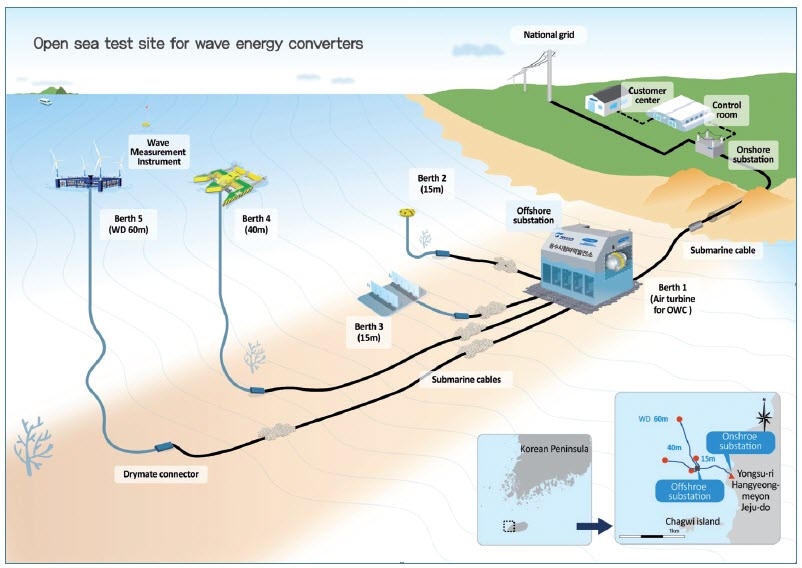
Open sea test site for wave energy converters
The construction project for open sea test bed with 5 berths of 4.5 MW grid connected capacity for the tidal energy converters is being carried out from May 2017 to December 2021 by KIOST. Furthermore, the performance test facility for components of tidal energy converters, such as blade and drive train, will also be constructed in this project. The southwestern waters of Korean peninsula are primarily considered as the tidal energy test site, where the Uldolmok tidal current pilot plant is installed nearby.
OPERATIONAL PROJECTS
500 kW Yongsoo OWC Pilot Plant
The construction of the Yongsoo OWC pilot plant was completed in July 2016 and installed at 1.5 km away from the coastline of Jeju Island. The plant, equipped with impulse turbines and 250 kW generators, and grid-connected by the 22.9 KV AC underwater cable, is currently under the trial run. By analysing the early performance data from the trial run, the maximum efficiency for the OWC chamber, the turbine and the generator turned out to be equal to 52.7%, 40.0% and 91.7%, respectively.
SUPRC 20 kW OTEC and 200 kW HOTEC Plants
Currently, the 20 kW OTEC and 200 kW HOTEC plants are in operation and conducting the performance test at the Sea Water Utilization Plant Research Centre at Goseong-gun, Gangwon-do, a subsidiary research base of KRISO dedicated to seawater and thermal energy application. The 20 kW OTEC plant uses 5ºC of deep-sea water as a heat sink and 26ºC of surface seawater as a heat source, and it exhibits the efficiency of 2.1%. While the 200 kW HOTEC plant also uses 5ºC of deep sea water as heat sink, it utilizes readily available thermal energy resources like geothermal energy near the coast, waste heat from ships, woodchip gasification, and other types of nearby power plants to increase the heat source temperature up to 75ºC which exhibits the efficiency of 7.7%. Currently, KRISO is preparing to conduct a demonstration experiment to verify the validity of the thermal energy from a 500 kW woodchip gasification plant for 200 kW HOTEC plant
PLANNED DEPLOYMENTS
Active-Controlled Tidal Current Power Generation System
The project is aimed to develop and demonstrate the active-controlled, high efficiency and low cost 200 kW Tidal Energy Converter (TEC), with the operating capacity applicable to the shallow sea conditions (about 20 m). The TEC was manufactured by KIOST and its caisson-type substructure was designed, fabricated, and deployed by Hyundai Engineering and Construction 2016. In 2017, the performance of PMSG and main drive train was evaluated using a portable dynamo test facility, and the internal communication system and the active rudder device for automatic and passive yaw control have been also tested in indoor and underwater environments. The TEC will be installed at the Uldolmok test site for open sea test in early 2018.
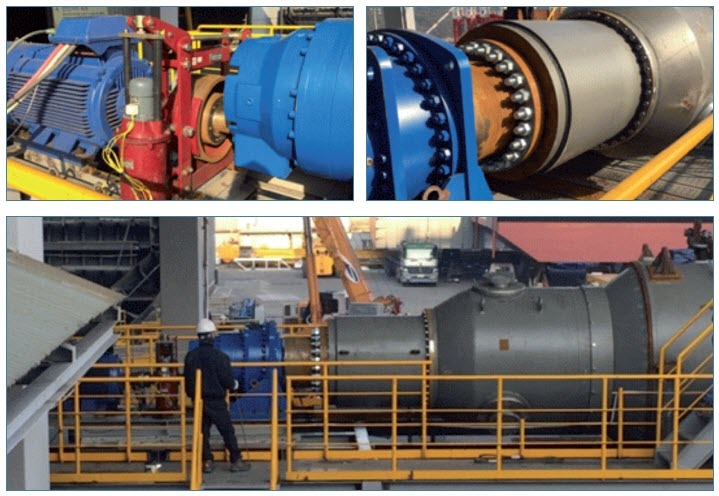
Dynamo test for PMSG and drive train of 200 kW TEC
Floating Pendulum Wave Energy Converter
Since 2012, the development project for the 300 KW wave energy converter has been carried out by KRISO with the support from MOF. In 2016, the construction of Floating Pendulum Wave Energy Converter (FPWEC), featured with a pendulum activated, high efficiency and high persistence rotary-vane hydraulic pump was completed and deployed to its operation site, waiting to be prepared for the sea test site. In 2017, the remote operating and monitoring system was tested and optimized. The FPWEC is planned to be tested using the forth berth of the open sea WEC test site on Jeju Island in mid-2018.
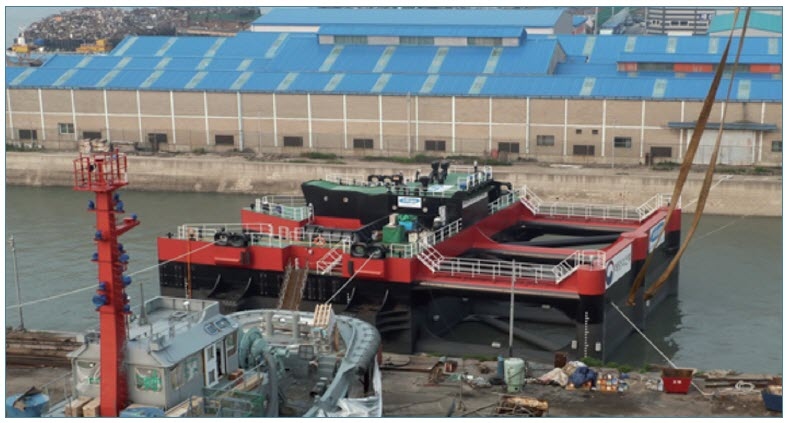
300 kW Floating pendulum wave energy converter in port
1 MW KRISO-OTEC
For the commercialization phase of the OTEC development, KRISO is in charge of manufacturing 1 MW OTEC demonstration plant. The plan is to complete the installation on a barge and perform the short-term operation in the eastern coast of South Korea by 2019, followed by transferring and construction as on-land type to conduct long-term operation at South Tarawa, Kiribati, in 2020. Until 2017, KRISO manufactured the 1.2 MW turbine generator and condensers, etc., and investigated the external environmental force of the plant site in South Tarawa for intake pipe installation. Furthermore, the Environment Impact Assessment (EIA) was conducted for 1 MW OTEC plant. Based on the result of 1 MW OTEC plant operation in Tarawa, KRISO is planning to design and receive the Development Approval (DA) for the 1 MW OTEC plant and the AIP for the 10 MW OTEC plant for multi-purpose industrialization.
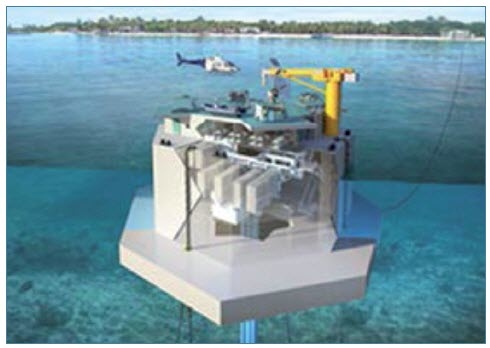 Offshore 1 MW OTEC |
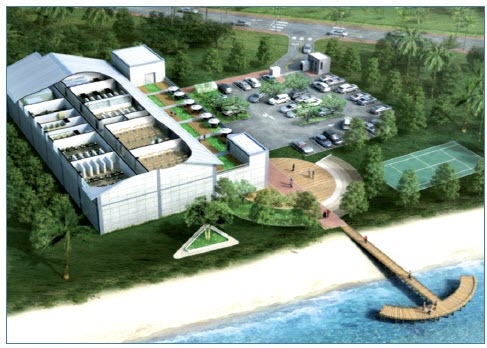 On-land 1MW O |



